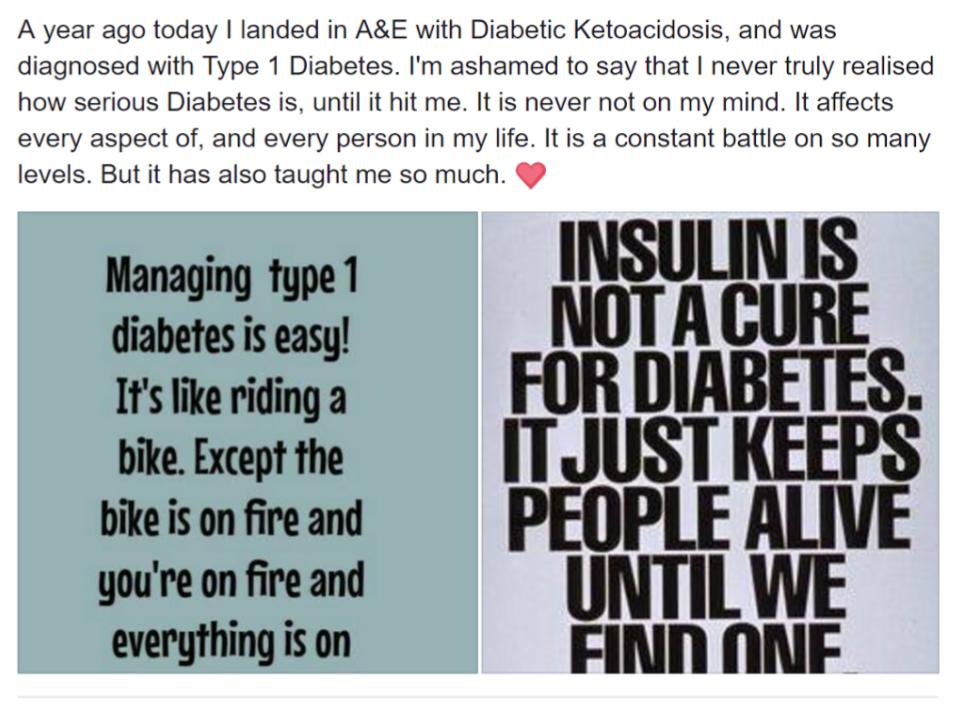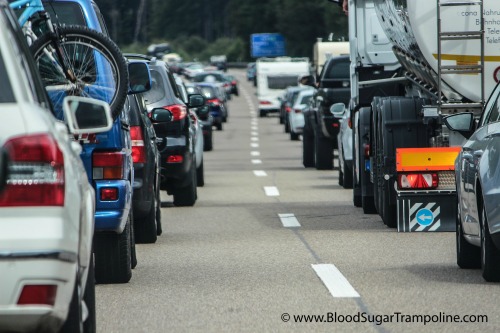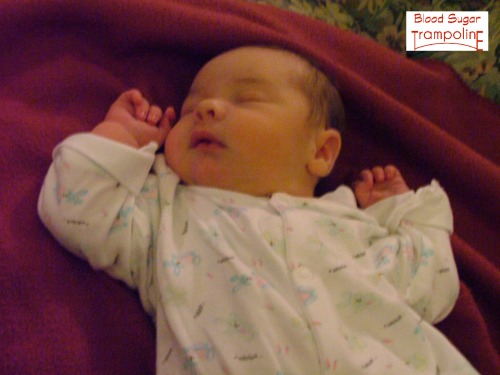Have you seen those posts on Facebook where you copy and paste a message that supposedly creates awareness for a heartbreaking illness without actually giving us any information about said illness? I come across them a lot, usually not for diabetes though. And then I saw this from a lady I had met recently. Now this is Awareness!
 You see, no amount of copy and paste onto my facebook profile page will create any awareness if I don’t mention something I know about that illness.
You see, no amount of copy and paste onto my facebook profile page will create any awareness if I don’t mention something I know about that illness.
This post prompted me to delve a little deeper into what exactly do the words “Diabetes awareness” mean to me and why do I want to create awareness around diabetes?
WELL, FIRSTLY, WHAT IS AWARENESS?
The definition from the Collins English dictionary of “Awareness” is having knowledge. So creating diabetes awareness is to inform people about it. And “Since informing the public can effect change, Raising Awareness is often the first activity an advocacy group engages in”- Marie Ennis-O’Connor, patient advocate.
But why do I want people to know about diabetes? Why would they need to know?
Is it because I want sympathy? Is it because I want people to know exactly how hard my life is? No, that’s not it for me.
I’ve begun to realise that there are different types of “audiences” for diabetes awareness and that my message changes depending on what group I’m with. Such as, if I’m talking to a local TD I’m usually asking for funding to improve health services, so I need to outline how much is saved through this investment and how quality of life with diabetes is improved.
LET’S BREAK IT DOWN; WHO NEEDS TO KNOW ABOUT DIABETES?
- My family and friends, - General public at large (i.e. The Masses) and - People who make decisions around our health service. - People living with diabetes.
WHAT AND WHY DO THEY NEED TO KNOW?
Each of these groups needs different information and for different reasons.
Diabetes Awareness for; people who know me. AKA Friends and Family.
This kind of awareness is very personal. And it revolves on what to do and say around me. This can be very tricky and even very dangerous. My husband has learned that if he asks me how I am and I say “Fine” that it’s code for “I am not fine at all!!! And God knows what mine field you might enter?”
For me this is a huge area of awareness. It involves teaching people not to be members of the diabetes “police” and not asking if I can eat that? To making sure you know how to administer a glucagon injection if I lose consciousness.
WHY? I teach my nearest and dearest all that I know about my diabetes so that they can support me in it.
Diabetes Awareness for; Members of the General Public.
Since starting my journey in diabetes awareness I have learned that a lot of people do not know that Diabetes can happen to anyone!!! Any age, any health, AN-NY. BODY. It’s a completely random condition, especially Type 1 Diabetes!
Everyone should know a couple of key pieces of information about diabetes, it may reduce your risk of diabetes complications and maybe even save a life.
WHY? A lot of people have type 2 diabetes and haven’t been diagnosed yet, which can lead to a life altering complication of diabetes being diagnosed first. If people with type 1 diabetes are not diagnosed quickly, they can end up in a critical condition in hospital. So, if I’m chatting casually to someone I don’t know and diabetes comes up in conversation I will outline the following;
- The signs and symptoms of type 1 diabetes (The 4 T’s; Tired, Thirsty, Thin, Toilet) - ALL the risk factors of type 2 diabetes (Over 40, Family history, High BP, High Cholesterol, low exercise and overweight for your height) https://www.diabetes.ie/are-you-at-risk/ - How serious diabetes is but that you don’t have to let it take over your life. - Then I will rinse, repeat, rinse and repeat.
Diabetes Awareness for People who make decisions around our health service; our TD’s, Hospital Managers, Our Health Service and our Department of Health.
This is a minefield! Our health service in general needs so much investment that we have to get in line with everyone else. And trying to impress on people who make decisions about funding our health care and the people who implement its delivery usually requires hard evidence such as research on how an improved health service for people with diabetes can improve and save lives, it also requires knowing how much it’s going to cost.
And sometimes, because of our low numbers in type 1 diabetes, we need the help of the general public to effect change.
Diabetes Awareness for People living with diabetes
This is the most straightforward diabetes awareness message, and it’s just to let our fellow D-Peeps know where they can go to find out everything they need to know to help them manage their condition. But most importantly that they are not alone and they can do this.
When I was first diagnosed with type 1 diabetes 24 years ago, I did not know anything about it. Not a thing! And I thought “why would I have needed to know?” Well, now I do know why people need to know about diabetes and why. A little knowledge is a powerful thing.











